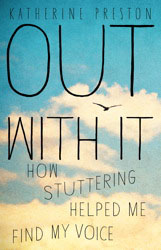
This is a review of the book Out With It, by Katherine Preston
When Katherine Preston first set out to write a book about stuttering, she intended it to be a series of interviews with people who stutter, researchers and speech therapists. Her book does still contain conversations with people she interviewed over a ten month period while traveling across the United States, with the purpose of talking to as many people as she could about stuttering. But after completing her journey and gathering her research, Katherine realized the book she needed to write was in fact her own memoir.
Katherine grew up an only child in a British household to two loving parents. Much of her story will be familiar to others who stutter – the first experience of stuttering as a child, people's reactions and her parent's dismay, the dashed hope that she would grow out of it. An early experience with speech therapy is devastating, due to the temporary state of regular speech it grants her, only to have it soon disappear.
Failure becomes a new word in my vocabulary. I held fluency for a moment, but it slipped through my fingers... My sense of self has been altered... every stuttered word makes me feel more guilty, more like a failure.
The convoluted interaction between stutterer and unsuspecting listener is depicted, with neither knowing quite how to react, the results varying from traumatic to humourous. She employs various tricks to bypass her stuttering, such as avoidance, developing a huge vocabulary to navigate around difficult words, and choosing a small circle of empathetic friends. After rejecting speech therapy, Katharine decides to do battle with it, seeing her stuttering as a "force competing within her" to be attacked and defeated. She would plow through life with the "giant white elephant," always there but never acknowledged, yet determined to not let it rule her life.

Katherine certainly does succeed in life – excelling in school, through her teenage years, making friends, traveling, and attending university. She becomes adept at exuding confidence, even in job interviews. With an air that her stuttering "doesn't bother me, so it shouldn't bother you", she lands a position at a newsroom in London. But a botched telephone call where she hangs up on a client after being unable to say her own name is earth shattering. Hiding in the bathroom, she looks in the mirror and sees a hypocrite, an impostor, and realizes "how deeply ashamed and scared" she really feels. It is then that Katherine decides to return to speech therapy and, eventually, to embark on a personal journey to research and write a book about stuttering.
Out With It also features researchers such as doctors Gerald McGuire and Dennis Drayna, who share their observations about the current state of research and treatment. There is advice, anecdotes and insights from successful people who also happen to stutter, some of whom are well-known; businessman Jack Welch, actress Emily Blunt, Michael Palin (who she confronts about his role as the much-tormented stutterer in A Fish Called Wanda) and wildlife preservationist Alan Rabinowitz.
In the book's final chapters, Katherine embraces her stuttering as a irrefutable part of herself, rather than some demon to be exorcised. Her stuttering still exists, with its familiar ebb and flow, but she no longer lives in a black and white world of good speech/bad speech. Sometimes obstacles in life are opportunities to enrich ourselves, to find strength; and gives those around us the chance to see beyond the surface of things. She concludes the book with the observation that stuttering has added a dimension to her life that otherwise would not have existed, and in the end made her a better person.
Today Katherine lives in New York with her partner and is a business woman, writer and an inspirational speaker. Out With It is available at Chapters.